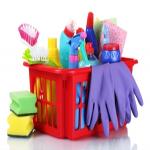Nonprofits Aim to Improve Safe Labeling of Household Products
This entry was posted on March 05, 2016 .

Consumer Groups Advancing Eco-labeling Initiatives While a lot of attention has been paid to creating more transparent labeling on the packaging of food and beverage products, there has been a lack of it on other items used daily in households. However, that may soon change.
FairWarning reported that the nonprofit Made Safe will launch a safety approval label next year that will be applied to products made without harmful chemicals or ingredients, much like the seal for personal care items released last year by the Environmental Working Group, EWG Verified. Both marks were created to address the issues that are not currently being covered by the United States Food and Drug Administration and Consumer Product Safety regulations.
Consumers demanding to know what is contained in the products they use is not exactly a new issue. Many companies understand that people value brands that are environmentally and socially responsible. Unfortunately, the existing policies make it so manufacturers are able to leverage marketing tactics that position their items as healthy.
Safe Seal of Approval ABC 7 News recently pointed out that although the ingredients listed on household products may be present, companies aren't necessarily required to disclose all of them, which could mislead shoppers into thinking something is safe when it isn't. For example, one approach some cleaning product manufacturers use to list some information then direct consumers to the website if they want more details.
However, the news source revealed that when one customer went to a brand's website to inquire about the ingredients of a particular item, it took nearly 15 minutes to find the information and, even once he did, it was limited. Some industry professionals argue that their approach isn't used to confuse or manipulate consumers but, rather, to protect company secrets, since "[e]ach and every product may have a specific formulation that is unique for that product."
Nancy Buermeyer, a member of the Breast Cancer Fund, told ABC7 News that this isn't a legitimate excuse because if the competitors wanted to find out what chemicals are used in a product they could do so by examining it in a lab.
"So the only people that are left in the dark are the government, consumers and workers," Buermeyer told the source.
Although a number of consumer groups were unable to have a law passed in California last month which would require the full disclosure of all ingredients on the labels of cleaning products, the source said they aren't giving up.
According to FairWarning, the Environmental Protection Agency has not been effective in adequately policing the use of toxic chemicals use in commercial products and, although the House and Senate have both passed bills intended to reform the laws set forth by the Toxic Substances Control Act of 1976, there has not been any definitive action taken yet. This is why some nonprofits are taking matters into their own hands.
Controlling Chemicals in Cleaning Products Both the EWG Verified and Made Safe labels aim to better inform shoppers about whether a product was made using safe ingredients and without harming animals, the source said. In addition, member companies are required to pay a fee. However, there are some differences between the two. While the EWG label only certifies skincare products, Made Safe will extend its verification seal to a wide range of household items that aren't food, including makeup, apparel and cleaning goods. Amy Ziff, branding consultant and founder of the Made Safe mark, told the source that eventually, the nonprofit hopes to extend the labeling certification to vehicles and electronic devices.
FairWarning revealed that Made Safe will offer two types of labels: base, which will verify the ingredients of an item to make sure it doesn't contain harmful chemicals, and "Nontoxic Certified," which will check for toxins by putting the products through testing procedures.
Some industry experts pointed out that the effectiveness of these seals could be limited because they have to compete with so many other packaging seals, the source said. However, the eco-labels could help by increasing the amount of information offered to consumers.
Request your FREE instant quote today.

 Custom Labels
Custom Labels  Custom Beverage Labels
Custom Beverage Labels  Custom Lip Balm Labels
Custom Lip Balm Labels  Custom Warning & Safety Labels
Custom Warning & Safety Labels  Perfume Bottle Labels
Perfume Bottle Labels  Bumper Stickers
Bumper Stickers  Custom Prop 65 Warning Labels
Custom Prop 65 Warning Labels  Custom Stickers
Custom Stickers